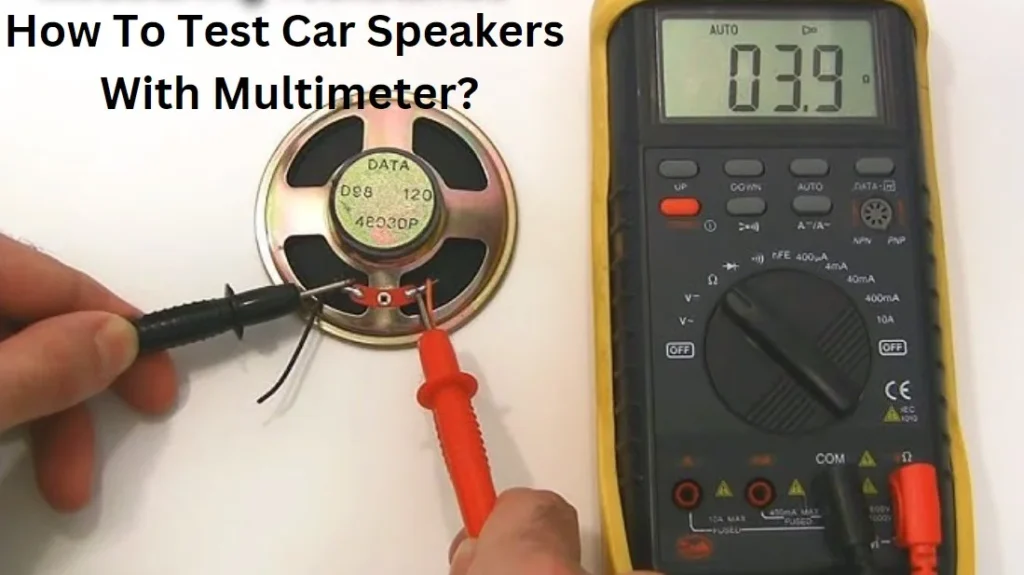Testing car speakers with a multimeter is a practical way to diagnose issues and ensure optimal audio performance in your vehicle.
A multimeter, a versatile electrical testing tool, can help you assess the condition of your car’s speakers by measuring resistance, or impedance, which indicates whether the speakers are functioning correctly.
This process is essential for troubleshooting problems such as sound distortion, lack of sound, or intermittent audio issues.
By following a few simple steps, you can use a multimeter to verify the health of your speakers, ensuring they deliver the clear, high-quality sound expected from your car’s audio system.
What Is A Multimeter?
A multimeter, short for “multiple meter,” is a versatile electronic measuring instrument used to measure various electrical properties in electronic circuits and electrical systems.
It’s a fundamental tool for electricians, electronics enthusiasts, and anyone working with electrical or electronic devices.
Multimeters are designed to provide precise and reliable measurements for several key electrical parameters
Why Test Car Speakers?
Before we delve into the testing process, it’s crucial to understand why testing car speakers is essential. Here are some compelling reasons:
1. Diagnosing Speaker Problems:
Testing your car speakers can help you pinpoint issues like blown speakers, damaged voice coils, or wiring problems. Identifying problems early can save you money on costly repairs or replacements.
2. Optimizing Sound Quality:
Regular speaker testing allows you to ensure that your car’s audio system delivers the best sound quality possible. You can make necessary adjustments to optimize the audio experience.
3. Safety:
Faulty speakers can produce distorted or excessively loud sounds, leading to distractions or discomfort while driving. Ensuring your speakers are in good working condition enhances safety on the road.

How To Test Car Speakers With Multimeter?
1. Set Up the Multimeter: Turn on the multimeter and set it to measure resistance (Ω).
2. Access the Speaker: Remove any panels or grilles to reach the speaker terminals.
3. Disconnect the Speaker: Unplug the speaker from the car’s wiring.
4. Measure Resistance: Touch the multimeter probes to the speaker terminals.
5. Read the Results: Check the display:
- 4-8 ohms: Speaker is likely good.
- High resistance: Possible damage.
- No reading (OL): Broken coil or disconnected internally.
6. Reconnect and Reassemble: Reconnect the speaker and reassemble any removed parts.
Troubleshooting Car Speaker Problems
If you find that your car speakers are blown, you will need to replace them. If you find that there is a short circuit in the speaker wire, you will need to repair or replace the wire.
Here are some additional tips for troubleshooting car speaker problems:
- Make sure that the speaker wires are properly connected to the speakers and the head unit.
- Check the speaker fuse to make sure that it is not blown.
- Try increasing the volume on the head unit. If you can hear the speakers at a higher volume, then the problem is likely with the head unit, not the speakers.
- If you have tried all of the above and you are still having problems with your car speakers, you may need to take the car to a qualified mechanic or audio technician.
Conclusion
Learning how to test car speakers with a multimeter is a valuable skill that can help you maintain the quality and performance of your car’s audio system.
By measuring the resistance, you can easily detect issues such as blown speakers or faulty wiring. This simple yet effective method ensures that your speakers are functioning correctly, providing you with the best possible sound experience.
Regularly testing your car speakers with a multimeter can save you from unnecessary repairs and expenses, keeping your audio system in top condition.
Embrace this easy diagnostic tool and enjoy crisp, clear audio on all your drives.
FAQs
How do I know if my car speakers are damaged?
If your speakers produce distorted or no sound, have visible damage, or fail the multimeter tests, they may be damaged.
Can I test all speakers with one multimeter?
Yes, you can use the same multimeter to test all speakers in your car.
What should the multimeter reading be for a working speaker?
A working car speaker typically reads between 4 to 8 ohms on the multimeter.
Do I need prior experience to test car speakers with a multimeter?
No, this guide provides step-by-step instructions suitable for beginners.
Is it necessary to disconnect the car battery before testing?
Yes, disconnecting the car battery is crucial to ensure your safety during the testing process.
How can I prevent speaker damage in the future?
Avoid playing audio at excessively high volumes, as this can lead to speaker damage over time.
- Can An AirTag Notify You When It Moves? Need To Know - November 20, 2024
- How Do You Make An Air Conditioner Colder? Tips for Better Cooling - November 18, 2024
- Why Is My Air Conditioner Blowing Hot Air In My Car? Ultimate Guide - November 17, 2024
